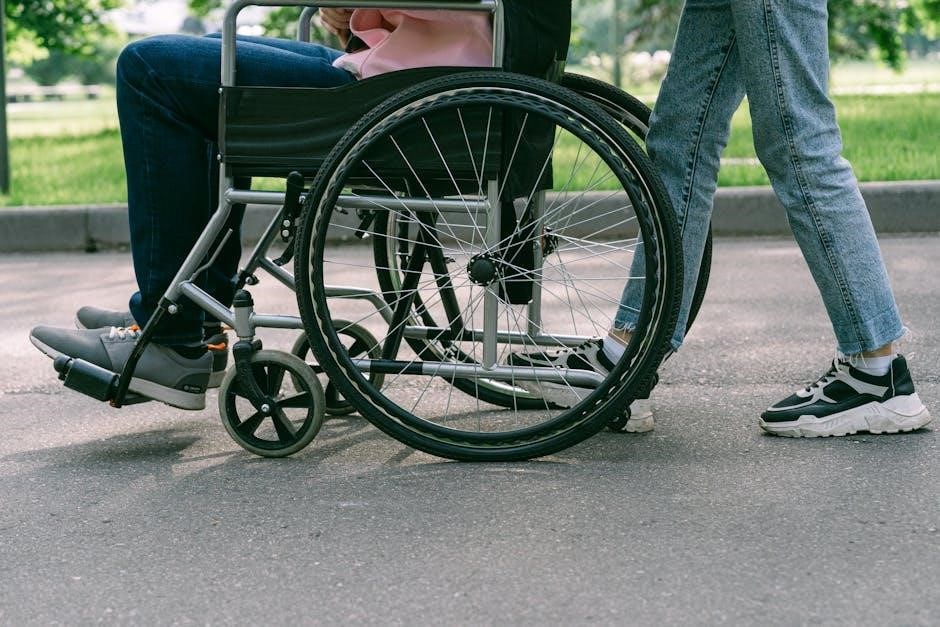Informed decision-making in health care empowers individuals to make choices aligned with their values and needs. It involves understanding options, risks, and benefits, supported by accurate information and guidance. This approach fosters trust and collaboration between patients and healthcare providers, ensuring personalized care. Resources like “Your Health Today” emphasize the importance of informed choices in a changing society, where health decisions are influenced by personal, social, and technological factors. By prioritizing education and awareness, individuals can navigate complex health systems effectively, leading to better health outcomes and overall well-being.

Personal Health Choices in a Modern Society
Personal health choices involve decisions about lifestyle, nutrition, and physical activity, influenced by modern societal factors like technology and cultural shifts. Education and awareness are key.
2.1 The Role of Nutrition
Nutrition plays a critical role in personal health choices, directly impacting physical well-being and mental clarity. A balanced diet provides essential nutrients, supporting energy levels and overall health. Modern society offers diverse food options, but making informed choices can be challenging due to misleading labels and fast food accessibility. Understanding nutritional needs helps individuals avoid chronic diseases like obesity and diabetes. The internet provides resources, such as guides and apps, to aid in meal planning and healthy eating. By prioritizing nutrition, individuals can enhance their quality of life and maintain long-term health. This section emphasizes the importance of nutrition in a changing world, where technology and awareness are key tools for making healthier choices.
2.2 Importance of Physical Activity
Physical activity is a cornerstone of personal health, contributing to both physical and mental well-being. Regular exercise helps maintain a healthy weight, strengthens muscles, and improves cardiovascular health. In today’s sedentary society, where technology often reduces the need for physical movement, staying active is more crucial than ever. Even moderate exercise, such as walking or cycling, can significantly reduce the risk of chronic diseases like heart disease and diabetes. Additionally, physical activity enhances mental health by reducing stress and anxiety, improving mood, and boosting energy levels. Incorporating exercise into daily routines, such as through sports, yoga, or structured workouts, promotes long-term health and resilience. By prioritizing physical activity, individuals can better navigate the challenges of a rapidly changing world and maintain overall well-being.
2.3 Managing Stress Effectively
Managing stress effectively is essential for maintaining overall health and well-being. Chronic stress can lead to physical and mental health issues, such as anxiety, depression, and a weakened immune system. Effective stress management involves identifying triggers, practicing relaxation techniques, and adopting healthy coping mechanisms. Strategies like deep breathing, mindfulness, and yoga can help reduce stress levels. Additionally, maintaining a balanced lifestyle, including regular physical activity, sufficient sleep, and a nutritious diet, plays a crucial role in stress resilience. Building a strong support network and setting realistic goals can also help individuals manage stress more effectively. By prioritizing stress management, individuals can improve their quality of life and better navigate the challenges of a changing society.
Social Influences on Health Behaviors
Social influences significantly shape health behaviors, as cultural norms, family, and peer networks impact decisions. Understanding these dynamics helps individuals make informed choices in a changing society.
3.1 Cultural Norms and Values
Cultural norms and values significantly influence health behaviors, shaping perceptions of wellness and illness. These societal standards often dictate practices related to diet, exercise, and stress management. For instance, certain cultures may emphasize communal meals, while others prioritize individual health routines. Societal expectations around body image and health can also impact decision-making. Additionally, cultural beliefs about traditional remedies versus modern medicine play a role in health choices. Understanding these influences is crucial for developing tailored health strategies. “Your Health Today” highlights how cultural values can both support and hinder healthy behaviors, emphasizing the importance of aligning health practices with personal and cultural identities. By recognizing these dynamics, individuals can make informed decisions that honor their heritage while promoting well-being.
3.2 The Impact of Social Networks
Social networks play a significant role in shaping health behaviors, as individuals are often influenced by the norms and actions of those around them. Friends, family, and community groups can provide support, share health information, and encourage positive habits. Conversely, negative influences within these networks can lead to unhealthy choices. The interconnectedness of modern society, amplified by digital platforms, means that health behaviors can spread rapidly. “Your Health Today” emphasizes the importance of leveraging social networks for health promotion, such as through community initiatives or peer support programs. By understanding the dynamics of social influence, individuals can harness positive relationships to make informed, healthier decisions. This highlights the dual role of social networks in both supporting and challenging health goals.

Mental Health in a Changing World
Mental health is a critical aspect of overall well-being, particularly in a world where societal changes, technological advancements, and environmental factors constantly evolve. The pressures of modern life, such as social media, work demands, and economic uncertainties, can significantly impact mental well-being. “Your Health Today” highlights the importance of addressing mental health proactively, emphasizing the need for resilience and coping strategies. The guide underscores the role of education and awareness in reducing stigma and promoting early intervention. By fostering a supportive environment and encouraging open conversations, individuals can better navigate challenges and maintain mental balance. This section explores the interplay between societal dynamics and mental health, offering insights into fostering emotional resilience in a rapidly changing world;
Substance Abuse and Health Choices
Substance abuse is a significant challenge that profoundly impacts health and well-being. It often arises from a combination of personal, social, and environmental factors, making it a complex issue to address. “Your Health Today” emphasizes the importance of understanding the root causes of substance abuse and the need for informed decisions to prevent or overcome addiction. Education plays a crucial role in raising awareness about the risks associated with substance abuse and the benefits of seeking help. By promoting healthier alternatives and providing access to supportive resources, individuals can make better choices that align with their long-term health goals. Addressing substance abuse requires a holistic approach that considers both individual and societal influences, fostering a path toward recovery and improved quality of life.

The Role of Digital Transformation in Health Care
Digital transformation has revolutionized health care, offering innovative tools and resources to enhance decision-making and care delivery. Telemedicine, wearable devices, and health apps provide greater accessibility to health services, enabling individuals to monitor their well-being proactively. Artificial intelligence and data analytics support personalized treatment plans and early disease detection. These technologies empower patients to take control of their health, fostering a more engaged and informed approach to care. However, the integration of digital solutions also raises concerns about privacy and data security. Despite these challenges, the benefits of digital transformation in health care are undeniable, creating a more efficient and patient-centric system that adapts to the evolving needs of society. By embracing these advancements, individuals can make smarter health choices in a rapidly changing world.
Navigating Health Information Privacy
Navigating health information privacy is crucial in today’s digital age, where personal data is increasingly vulnerable to breaches. Individuals must understand their rights and the measures to protect their health information. Regulations like HIPAA ensure that medical records remain confidential, but the rise of digital health tools and apps complicates privacy. Patients should be aware of how their data is collected, stored, and shared. Encryption and secure platforms are essential for safeguarding sensitive information. Education and awareness are key to empowering individuals to make informed decisions about their health data. Balancing privacy concerns with the benefits of digital health innovations requires careful consideration and proactive measures to maintain control over personal health information in a changing society. By staying informed, individuals can protect their privacy while leveraging technological advancements for better health outcomes.
Community Support Systems for Health
Community support systems play a vital role in promoting health and well-being by providing individuals with resources, guidance, and networks. These systems often involve partnerships between local organizations, healthcare providers, and community members to address diverse health needs. Support groups, educational workshops, and outreach programs are examples of how communities can empower individuals to make informed health choices. Digital platforms and telehealth services have further expanded access to these resources, ensuring that even remote or underserved populations can benefit. By fostering connections and reducing barriers, community support systems help individuals navigate health challenges, prevent illnesses, and manage chronic conditions. They also emphasize the importance of collective efforts in creating healthier environments and fostering resilience. Strong community support systems are essential for building a society where everyone has the opportunity to thrive and maintain optimal health.
The Influence of Artificial Intelligence on Health Decisions
Artificial Intelligence (AI) is revolutionizing health care by enhancing decision-making processes for both patients and providers. AI algorithms analyze vast amounts of data to provide personalized recommendations, improving diagnostics and treatment plans. For instance, AI-powered tools can predict disease risks, suggest lifestyle changes, and even assist in mental health support. However, the reliance on AI raises questions about data privacy and algorithmic biases. Despite these challenges, AI has the potential to democratize access to health information, enabling individuals to make more informed choices. By integrating AI into health systems, society can address complex health issues more effectively, fostering a future where technology and human judgment work in harmony to improve well-being. This transformation underscores the need for ethical guidelines to ensure AI remains a beneficial force in health care.

Health Education and Awareness
Health education and awareness are cornerstone strategies for empowering individuals to make informed decisions about their well-being. By providing accurate and accessible information, health education enables people to understand the factors influencing their health, such as nutrition, physical activity, and mental well-being. Resources like “Your Health Today” emphasize the importance of adopting healthy lifestyles and navigating societal changes that impact health choices. Awareness campaigns highlight preventable risks, such as substance abuse and stress, while promoting proactive measures like regular check-ups and balanced diets. Educating communities fosters a culture of responsibility and collective action, encouraging individuals to prioritize their health. Moreover, digital tools and AI-driven platforms are enhancing health education, making it more engaging and personalized. Ultimately, health education is a vital tool for improving health outcomes and empowering individuals to thrive in a rapidly changing world.
Taking charge of your health is a dynamic and personal journey that requires informed decision-making and proactive engagement. In today’s rapidly changing society, individuals must navigate a complex interplay of factors, from cultural influences to technological advancements, that shape their health choices. Education and awareness are key to empowering individuals to make decisions that align with their values and priorities. By understanding the role of nutrition, physical activity, mental well-being, and social networks, individuals can adopt healthier lifestyles. Additionally, leveraging digital tools and community support systems can enhance health outcomes. Ultimately, taking charge of your health involves embracing responsibility, seeking knowledge, and fostering resilience. This empowers individuals to thrive in a changing world, making informed choices that promote long-term well-being and quality of life;
